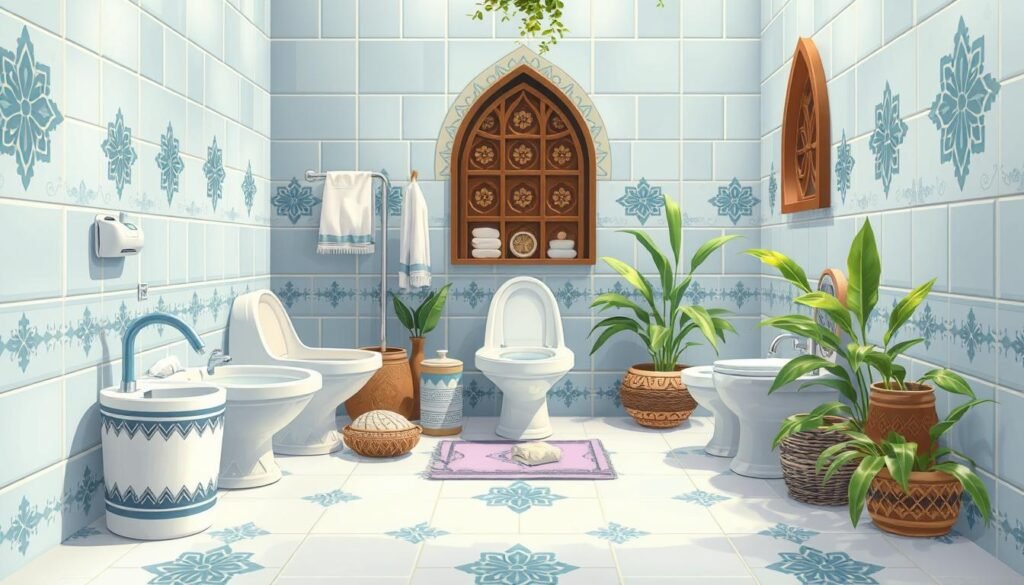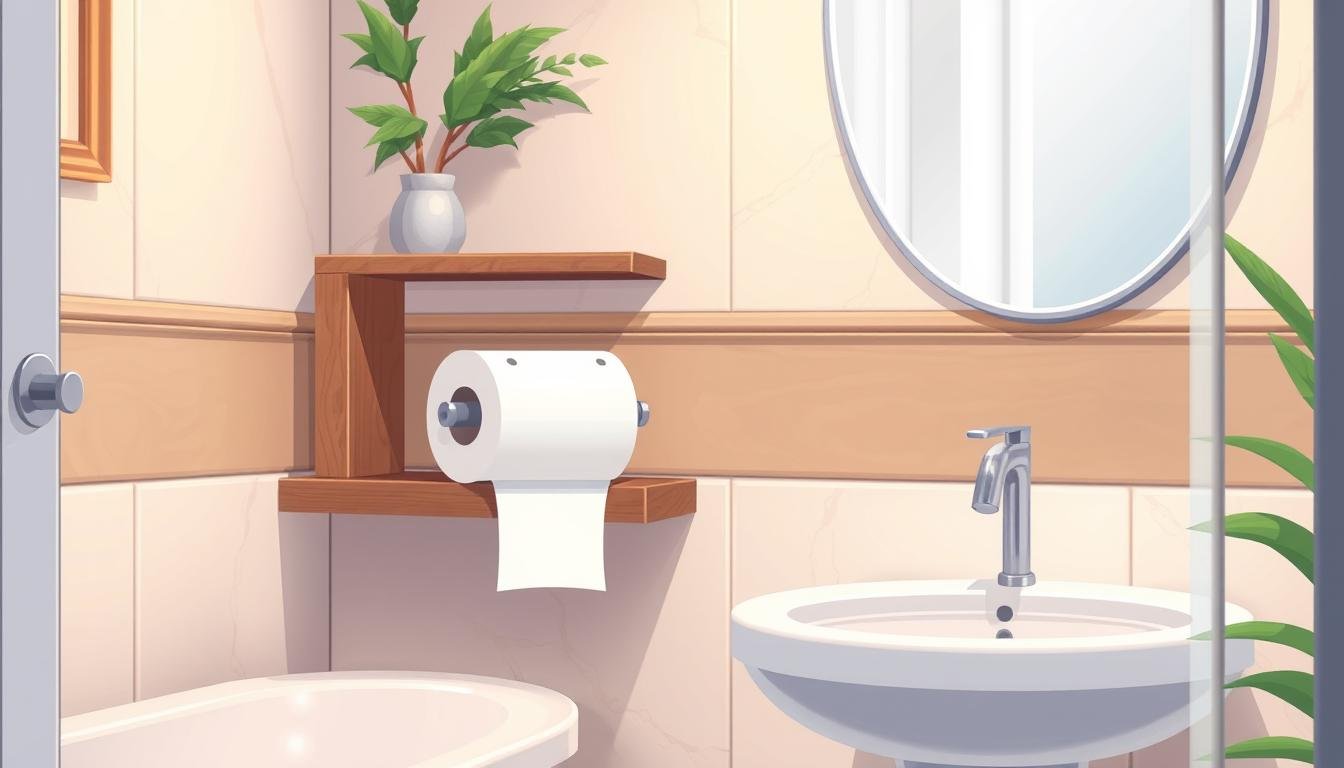Have you ever thought about how culture affects personal hygiene in different religions? The question of whether Muslims can use toilet paper is more complex than a simple yes or no. Islamic hygiene is based on tradition, often using water instead of paper.
Millions of Muslims wash their backside after using the toilet with a lota. We will explore the history, religious views, and modern practices of personal cleaning in Islam.
In today’s world, it’s important to understand how Muslims clean themselves. This includes using toilet paper or water-based methods. Many Muslims prefer water-based cleaning over dry methods.
This talk will help us understand Islamic views on cleanliness. We’ll look at cultural differences in Muslim communities. We’ll also see how these differences affect cleaning practices in both Muslim and non-Muslim countries.
Let’s dive into the world of hygiene, culture, and the various cleaning methods used by Muslims. Some use water, others toilet paper, and some use both in different ways.
For more on cultural views of smoking in Muslim communities, check out this piece on Islamic perspectives on smoking.
Understanding Islamic Hygiene Practices
In Islamic hygiene, purity is more than just being clean. It’s about spiritual purity, or taharah, needed before prayer. Cleanliness shows respect for God’s teachings and faith.
Personal hygiene rules include practices like wudu. This is a ritual cleanse before prayers. It involves washing hands, face, and feet. This keeps Muslims pure and connected to their faith.
Using water for cleansing after the restroom is also key. Starting with the left foot and saying a prayer is important. These steps keep us clean and mindful of our faith.
Handwashing often is encouraged, before meals and after using the restroom. It keeps us healthy and follows Islamic teachings. Eating or drinking in restrooms is seen as rude, showing the importance of cleanliness.
With 4.5 billion people lacking proper toilets, these rules are even more critical. Keeping mosques and communities clean follows our faith and improves health.
Historical Context of Personal Hygiene in Islam
Looking into Islamic history shows a strong focus on cleanliness. This started with Prophet Muhammad (peace be upon him). The ways of cleaning that were set then have lasted for centuries.
Back then, Muslims used water, stones, and leaves for cleaning. These were things they could find easily. It showed their respect for being clean.
Islamic rules say you should clean yourself after using the bathroom. You can use water or an odd number of smooth stones. Today, many think toilet paper is okay too.
There are special ways to do this, like using your right foot to leave the bathroom. You also say a prayer called Dua to thank for being clean.
There are rules about where and how to do these things. For example, you shouldn’t face the Qibla when you’re in the bathroom. This shows how important following Islamic rules is, even for small things.
Talking or eating while in the bathroom is not allowed. This shows Islam’s unique view on keeping clean. All these rules help us understand the importance of cleanliness in Islam.
Islamic Jurisprudence on Cleanliness
Islamic law has clear rules for cleanliness. These rules come from the Quran and Hadith. They form a strong legal system called the fiqh of hygiene. Cleanliness in Islam is not just about rituals. It shows a deep commitment to health and community.
Old texts talk about using water to clean after using the bathroom. They mention using stones with water too. This shows Islam allows different ways to clean, depending on the situation. It also shows water is the best choice, but other methods are okay too.
Recently, the Turkish government said it’s okay to use toilet paper. But water is preferred. This shows Islamic law can change with the times while staying true to its roots.
Looking into these cleanliness rules helps us understand personal hygiene better. Scholars like Ayatollah Sistani give advice on washing after using the bathroom. This shows different views within Islamic law. The ongoing talks among scholars help these rules stay relevant for today’s Muslims. It shows how deeply connected Islam is to cleanliness and health.
The Role of Water in Islamic Hygiene
In Islamic practice, water is key for both physical and spiritual cleanliness. It’s needed for wudu (ablution) and ghusl (full body purification). Without enough water, keeping clean can be a challenge. Luckily, Islamic rules offer clear advice on this.
Importance of Water for Purification
Water is the main way to purify, known for its cleaning power. Scholars give detailed steps for istinja, the act of cleaning after using the restroom. Ayatollah Sistani says to wash once, while others suggest twice, if water isn’t flowing.
Cleaning the bathroom well is also important. This shows the faith’s strong focus on hygiene. Staying clean, like before prayers, is encouraged.
Alternatives to Water in Absence of Availability
When water is not there, Islamic law allows for other cleaning methods. Stones or tissue paper can be used. This shows the faith’s flexibility for different situations.
Using a niqab as a protective covering is also considered. But keeping clean is the main goal. Using water purification methods can also cut toilet paper use by 50%. This mix of tradition and modern tools is seen in some places.
Can Muslims Use Toilet Paper?
Using toilet paper in Islam is a topic of debate. Scholars say it’s okay to use it for cleaning, as long as it’s clean. They suggest using at least three wipes to follow proper technique.
When water is hard to find, toilet paper works well. It follows the rules in many hadiths. Even though using water is better, toilet paper is okay too.
Cleanliness is key in Islam, no matter what you use. This shows Islamic teachings can adapt to any situation. It helps followers stay clean everywhere they go.
Materials Permitted for Personal Cleaning
In the Islamic tradition, we see many ways to clean ourselves. These methods go from old to new. They show how important cleanliness is in Islam and how different cultures see it.
When we clean ourselves, we use special materials. These help us stay pure during our daily routines.

Comparison of Toilet Paper and Traditional Methods
The debate on toilet paper vs stones is big in Islam. Toilet paper is easy to use and common in the West. But, stones have a long history in Islamic cleaning.
Islamic law says we can use stones if water is not available. This tradition values natural items for our care. Turkey’s religious leaders said toilet paper is okay in 2015. But they also said water is better for cleaning.
Other cultures also have their ways of cleaning. For example, France, Japan, and Spain often use bidets. This shows how water is key in Islamic cleaning, along with the right materials.
This mix of old and new lets us find a good way to clean ourselves. It respects our heritage and meets our modern needs.
Hadith Supporting Hygiene Practices
Cleanliness is very important in Islam, thanks to Prophet Muhammad’s teachings. He showed us how to stay clean through many Hadith on hygiene. These teachings help us behave well and shape our culture.
The Prophet told us to use our left foot when we go to the bathroom. He also said to cover ourselves when others are around. He even told us to face a certain direction while on the toilet. This shows how important staying clean is in our lives.
Prophet Muhammad taught us to use water to clean ourselves after we go to the bathroom. Scholars have different ideas about how many times we should wash. This shows that Islamic teachings are flexible.
He also gave us rules for cleaning ourselves, like standing while urinating. This shows we should be careful about staying clean. He also taught us to keep ourselves pure by washing our hands often.
He even told us to say special prayers while we wash our hands. This adds spiritual value to our cleaning routine.
It’s also good to go to the bathroom before we pray or go to bed. Many Muslims use a watering can to clean the bathroom after use. This is a common practice in many places, including Canada.
This shows how important staying clean is in Islam. But, it can be hard to talk about cleaning the bathroom with people who don’t follow Islam. This shows we need to understand each other’s cultures better.
Contemporary Practices in Muslim Cultures
Modern Muslim hygiene practices mix old ways with new solutions. This shows how these rituals change in different cultures. Many Muslims use a lota, a small water container, for cleaning. This method shows water’s key role in Islamic hygiene, matching cultural cleaning values.
Bidets are also becoming more popular. They offer a clean way to stay hygienic, fitting with Islamic teachings on cleanliness.
Use of Lota and Bidets
In many Muslim cultures, the lota is key for personal hygiene. It shows water’s role in keeping clean before prayer. Bidets are also gaining fans. They make cleaning easier and more comfortable, keeping values of cleanliness intact.
Adoption of Toilet Paper in Western Countries
In Western countries, toilet paper is more accepted among Muslims. It shows a change in how Muslims keep clean. Toilet paper is used when water is not available.
This mix of old and new shows Muslims adapting to their surroundings. They keep their values of cleanliness while using modern conveniences.
Islamic Views on Environmental Health and Sustainability
Islam teaches us to care for the environment and our health. It shows us the importance of being clean and respecting nature. We must look after our surroundings, not just ourselves.
About 75% of Muslims have clean drinking water. But, Muslim countries in dry areas have only 1% of the world’s fresh water. This makes saving water very important.
Climate change and more people mean less clean water in some Muslim countries. Islam teaches us to use water wisely. This helps keep us clean and protects the environment.

The “Reinvent The Toilet Challenge” shows how important clean toilets are. It’s a big step towards better hygiene for 2.5 billion people. Islam believes in taking care of our health and the planet together.
Hygiene Before Prayer: Essential Practices
In Islam, keeping clean before prayer is very important. It’s not just about washing up. It’s about getting ready to connect with God. Before prayer, people do rituals that show they are serious about their faith.
Connection Between Cleanliness and Salah
The Quran talks a lot about the importance of being clean. It says God loves those who are clean in body and spirit. Washing up, or Wudu, is a special way to clean yourself before prayer.
Wudu means washing your face, hands, arms, head, and feet. You must do it carefully and with respect. It’s a way to prepare your body and mind for prayer.
Pre-prayer rituals are very important in Islam. They help people focus and get ready for prayer. Having easy access to hygiene, like the ABDEEZ Portable Bidet, is very helpful. It makes it easier to stay clean, even when there’s no water around.
Islam also values spiritual purity. Wudu is needed for prayer, and a full bath, or ghusl, is needed for bigger impurities. Even when water is hard to find, there’s a way to clean up. This shows Islam cares about its followers’ needs.
Dispensations in Islamic Hygiene: Rukhsah
Rukhsah, or dispensations in hygiene, shows Islam’s flexibility and understanding of human needs. It proves that Islam is easy and accessible for everyone. For example, using toilet paper is okay when it’s available.
This shows that while using water is important, Islam also accepts other options when needed. This balance is key in Islamic hygiene.
When we talk about Islamic practices, we often miss this important part. Rukhsah in hygiene helps people follow their cleansing duties even when it’s hard. It makes sure that following Islamic rules doesn’t cause too much trouble.
These rules help people worship and live their daily lives better. Understanding rukhsah helps us see Islam’s view on human experiences and needs. It makes us appreciate Islamic rules more, like those for personal hygiene.
FAQ
Can Muslims use toilet paper for personal hygiene?
What is the significance of cleanliness in Islam?
What were the traditional methods of personal hygiene used in historical Islamic practices?
How do different schools of thought address hygiene in Islamic jurisprudence?
Why is water considered essential for purification in Islamic practices?
Are there alternatives to water for purification in Islam?
How effective is toilet paper as a cleaning method compared to traditional materials?
Which Hadiths emphasize the importance of hygiene practices in Islam?
What are the common contemporary practices regarding hygiene among Muslims?
How does Islamic teaching relate personal hygiene to environmental health?
Why is proper hygiene essential before performing Salah?
What is the concept of rukhsah in Islamic hygiene practices?

Embracing Faith, One Insight at a Time!
The teachings of the Quran have always guided my path. With a deep passion for Islamic knowledge, I strive to blend the wisdom of tradition with the relevance of today, making the timeless messages of Islam accessible and meaningful for everyone.
Muslim Culture Hub is my platform to share historical insights and thought-provoking articles, exploring both well-known and lesser-discussed aspects of Islamic culture and beliefs. My mission is to create an inclusive online space where everyone can learn, strengthen their faith, and connect with the profound message of Islam.
Join the journey!
May peace be upon you.








